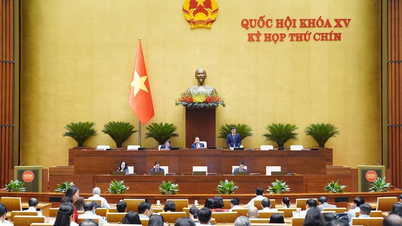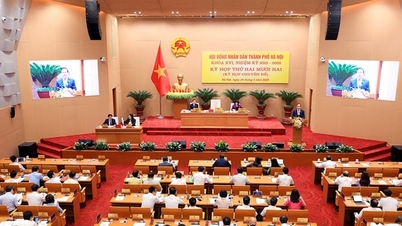The United States on July 5 strongly protested China's plan to restrict exports of gallium and germanium, adding further tension to a bilateral relationship that is already plagued by economic and security issues.
“We firmly oppose China’s recently announced export controls on gallium and germanium,” a US Commerce Department spokesperson said on July 5, referring to the measures announced by China earlier this week.
Earlier this week, China imposed export controls on gallium and germanium products. The abrupt announcement of the controls, effective August 1, sent companies scrambling to secure supplies and sent prices soaring.
China is the world's largest producer of gallium and germanium, with more than 95% of global gallium production and 67% of global germanium production.

Workers work at a chip factory in Suqian, Jiangsu Province, China. Photo: Global Times
Both metals are on a list of 50 minerals that the US Geological Survey considers “critical,” meaning they are essential to the US economy or national security and have supply chains that are vulnerable to disruption.
Germanium is used in high-speed computer chips, plastics and in military equipment such as night vision devices and satellite imaging sensors, while gallium is a key ingredient in a type of semiconductor used in phone chargers and electric cars, with growing commercial and military applications.
The US military uses gallium nitride (GaN) for its most advanced radars, and it is also being used to replace the Patriot missile defense system made by RTX.
The United States imported about 53% of its gallium from China between 2018 and 2021, according to the U.S. Geological Survey. Imports fell significantly in 2019 after the U.S. imposed higher tariffs on the metal.
The US and China have sought to stabilize their complicated relationship by increasing the frequency of high-level talks. However, China announced the latest restrictions just before the US Independence Day holiday and ahead of a visit to Beijing by US Treasury Secretary Janet Yellen.

The curbs on exports of semiconductor materials are China's second major retaliatory move, after it banned some domestic companies from buying products from US chipmaker Micron. Photo: WSJ
The move marks the latest chapter in the US-China trade war, which has escalated over a range of issues including trade tariffs, the origins of the Covid-19 pandemic, cybersecurity and technology competition.
According to economic analysts, this is China's retaliation against Washington's efforts to limit the country's technological advances.
On July 5, former Chinese Vice Minister of Commerce Wei Jianguo described China's latest controls as a "heavy, well-thought-out blow" and "just a start."
“These actions underscore the need to diversify supply chains. The United States will consult with allies and partners to address this issue and build resilience in critical supply chains,” a Commerce Department spokesperson said in an emailed statement .
Nguyen Tuyet (According to Reuters, Kyodo News, WSJ)
Source



![[Photo] General Secretary To Lam meets and expresses gratitude to Vietnam's Belarusian friends](https://vphoto.vietnam.vn/thumb/1200x675/vietnam/resource/IMAGE/2025/5/11/c515ee2054c54a87aa8a7cb520f2fa6e)
![[Photo] General Secretary To Lam arrives in Minsk, begins state visit to Belarus](https://vphoto.vietnam.vn/thumb/1200x675/vietnam/resource/IMAGE/2025/5/11/76602f587468437f8b5b7104495f444d)

![[Photo] General Secretary To Lam concludes visit to Russia, departs for Belarus](https://vphoto.vietnam.vn/thumb/1200x675/vietnam/resource/IMAGE/2025/5/11/0acf1081a95e4b1d9886c67fdafd95ed)




























![[Photo] National Assembly Chairman Tran Thanh Man attends the Party Congress of the Committee for Culture and Social Affairs](https://vphoto.vietnam.vn/thumb/1200x675/vietnam/resource/IMAGE/2025/5/11/f5ed02beb9404bca998a08b34ef255a6)






























































Comment (0)